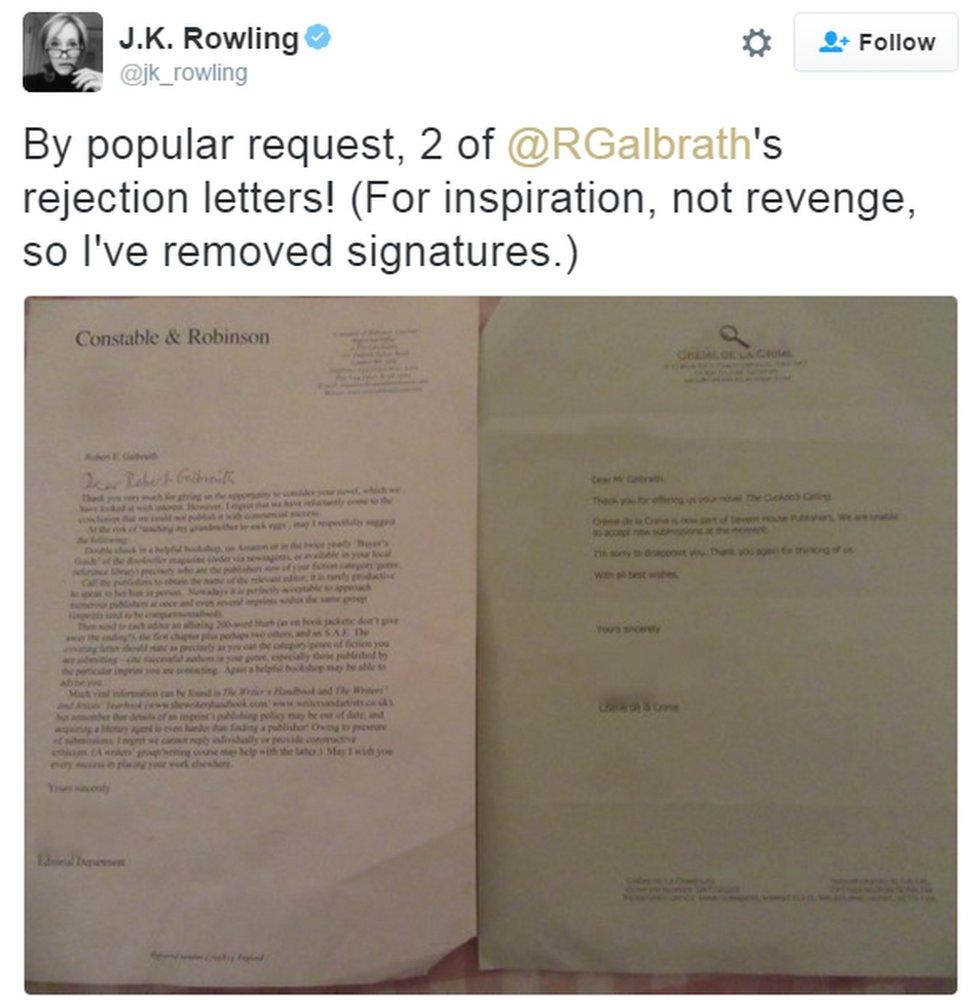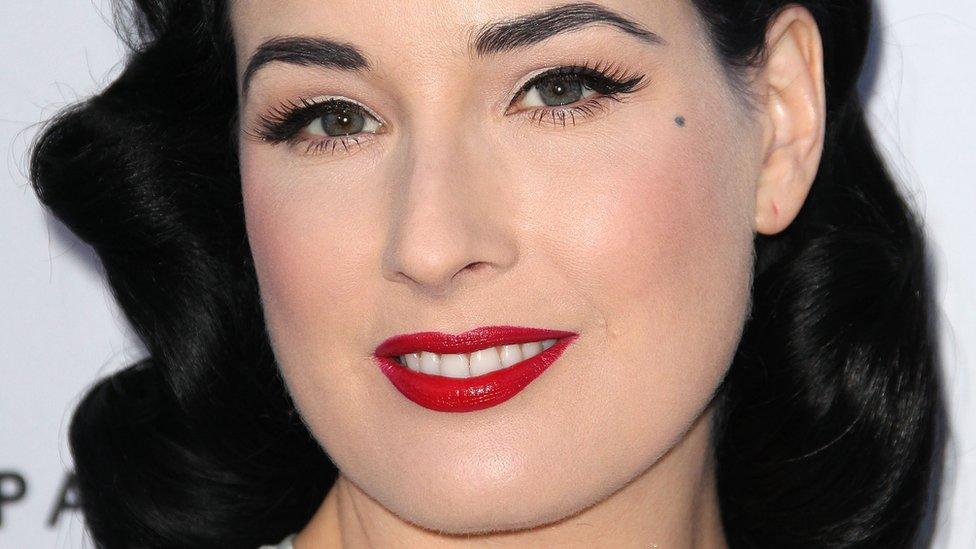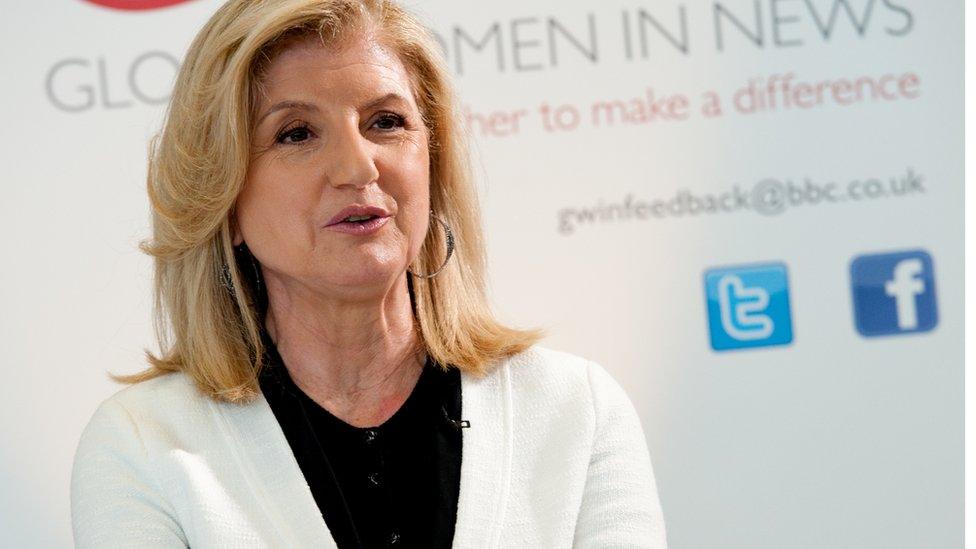Tips for success: 11 ways to silence your 'inner critic'
- Published

Too many women are letting their "inner critic" stop them from succeeding in life, according to the head of a chain of all-girl schools.
But how do you go about silencing your "inner critic"? We've compiled some advice from BBC News readers - and a few well-known faces.
To contribute your advice, email haveyoursay@bbc.co.uk, external

JK Rowling - 'Learn to fail'

Harry Potter author JK Rowling's advice to graduating Harvard students in 2008 to embrace "failure" became the prestigious university's most viewed commencement speech, external.
"I had failed on an epic scale. An exceptionally short-lived marriage had imploded, and I was jobless, a lone parent, and as poor as it is possible to be in modern Britain, without being homeless.
"Rock bottom became the solid foundation on which I built my life.
"It is impossible to live without failing at something, unless you live so cautiously that you might as well have not lived at all, in which case you've failed by default. Such knowledge is a true gift, for all that it is painfully won, and it has been worth more than any qualification I have ever earned."
Earlier this year, "for inspiration, not revenge", Rowling also made public several rejection letters she got from publishers for her detective novels under the pseudonym Robert Galbraith.


Ellie House, by email - 'Remember Instagram isn't real'
"Don't compare yourself to others, that's the first rule. I would always belittle my achievements by comparing myself. Do listen to your gut instinct, don't do something because you feel it is expected of you. Don't trawl social media because you will automatically feel awful about yourself, remember Instagram isn't real. Talk to your mum and remember you are loved for who you are.
"Find your passion, it makes life so much easier. Try and do stuff just for you, be that netball or yoga. Exercise is key to good mental health. Reach out to other women and become involved in the conversation, there are plenty of women out there blogging about your feelings and doing TED talks. And finally, don't put yourself down because you will very quickly learn there are plenty of people in this world willing to do this for free."

Sheryl Sandberg - "Take a deep breath and speak up anyway"

Even as Facebook's chief operating officer, Sheryl Sandberg says she struggles with profound self-doubt - her book Lean In gives women advice on how to deal with it.
She told graduates in a speech in Chicago, external in 2014 to dare to "dream bigger".
"Over my many years in school and the workforce, I have seen so many people hold themselves back. I see people sit on the side of the room instead of sitting at the table. I see people sit in the back rather than at the front. I see people lower their hands rather than keep them up.
"And that's why I force myself to sit at the table, even when I am not sure I belong there — and yes, this still happens to me. And when I'm not sure anyone wants my opinion, I take a deep breath and speak up anyway."

Dita Von Teese - 'Don't tell people your flaws'

Burlesque dancer and entrepreneur Dita Von Teese appears supremely confident when she performs, but has said she considers herself to be lacking in confidence. She told the Guardian, external her strategy for dealing with self doubt.
"I make a point to never, ever point out my physical flaws... this is advice I give to women as often as I can. People don't notice the things we see in ourselves that we hate, so why direct them to it? Living with your flaws doesn't mean you should tell people about them.

Katrina McGrath, London, by email - 'Remember it's OK to get it wrong'
"I teach physics and chemistry. A big problem for my students that needs to be solved is inhibition from having a go at problems, particularly practical work.
"I tend to select girls to help me with demonstrations and practical set-ups and in some classes I have single-sex groups for practical work, usually if I think a little competition can be managed to healthy effect.
"I say things like, 'It's OK to get it wrong', 'I'm so glad you got that wrong [pause for laughter] because now we can learn from it [thoughtful silence ensues]'."

Dame Kelly Holmes - 'Regret is worse than failure'

Double Olympic gold medallist Dame Kelly Holmes says fear of failure can be both a positive and a negative.
"It can be debilitating for some athletes who start worrying about everything that could potentially go wrong, but the fear of failure drove me on as I hated the thought that I could come off the track feeling I hadn't done absolutely everything I could have to win.
"I always tell athletes I'm mentoring there is nothing worse than leaving the track with any regrets."

Elaine Byrne, Dublin, by email - 'Don't be deceived by power'
"One of the main things I have found in overcoming the inner critic is not to be deceived by those whose power comes from status, yet have no personal power of their own.
"They must convince you that you are inferior in order to maintain their superiority."

Arianna Huffington - 'Evict the obnoxious roommate in your head'

The co-founder of the Huffington Post, Arianna Huffington,who has been named as one of Forbes' Most Influential Women In Media, advises humour, external to deal with "that inner critic".
"Even our worst enemies don't talk about us the way we talk to ourselves. I call this voice the obnoxious roommate living in our head. It feeds on putting us down and strengthening our insecurities and doubts.
"I wish someone would invent a tape recorder that we could attach to our brains to record everything we tell ourselves. We would realise how important it is to stop this negative self-talk."

Emma Watson - 'If not me, who?'

Emma Watson, who is both an actress and UN women goodwill ambassador, has said she "really wrestled" with success, and that she feels like an "imposter".
She also revealed that she was "terrified" the night before giving a key speech at the UN's New York headquarters. In the speech, external, she explained how she overcame her fears.
"In my nervousness for this speech and in my moments of doubt, I told myself firmly, "If not me, who? If not now, when?"
"If you have similar doubts when opportunities are presented to you, I hope those words will be helpful."

Michelle Obama - 'Paint a picture for yourself'

US First Lady Michelle Obama, speaking on a visit to Oxford University, told students from north London that she had "all kinds of worries and fears", external before she went to college.
"I worried that I wouldn't fit in somewhere so different from where I'd grown up, or with people whose backgrounds were so different from mine. But after a few months in college, away from home on my own, I realised that I was just as capable and I had just as much to offer any of my classmates.
"You have to mentally believe that you can be here. You have to paint that picture for yourself."

And finally... Linda Papadopoulos on how to train your brain

Chartered counselling and health psychologist Linda Papadopoulos, who has also offered advice on several TV shows, believes in the power of cognitive behavioural therapy to help people manage the feelings of self-doubt and has three practical tips:
Accept compliments - "If someone compliments you on a job well done, and your immediate thought is, 'I didn't do a good job, they don't mean it', stop right there. They said it. Take it at face value. Accept it. And move on."
Take responsibility for your success - "Try writing down all the steps that have led you to where you are now. It might be a course that you did, or an important decision you made. Ultimately you need to take some responsibility for your success, and by remembering what you've done, that will be easier."
Talk to someone you respect - "Try and speak to someone about how you're feeling, a mentor perhaps. Name your fears. Getting it out in open about how you feel will allow someone you respect to challenge those thoughts."

- Published15 June 2016

- Published25 April 2016

- Attribution
- Published25 June 2015

- Published13 April 2012
